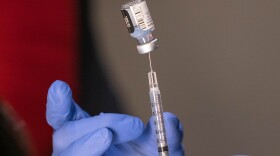The Yukon-Kuskokwim Health Corporation is beginning the next phase of COVID-19 vaccinations, which includes Elders and frontline essential workers. To answer questions about the vaccines, YKHC hosted a second informational session last night with Alaska’s Chief Medical Officer, Dr. Anne Zink.
[Listen to a recording of the full information session here.]
YKHC now has enough COVID-19 vaccine doses for between 4,000 and 5,000 people. YKHC Chief of Staff Dr. Ellen Hodges reported that 1,300 doses of the Moderna vaccine arrived in Bethel on Dec. 21. She also said that YKHC doctors, like elsewhere, are discovering an extra sixth dose in vials of the Pfizer vaccine that were supposed to hold just five doses. That means YKHC received more than 3,000 doses of the Pfizer vaccine.
Zink said that Alaska can expect allocations of vaccines monthly. She did not know how many doses would be arriving in January. Hodges said that they would reserve the Moderna vaccine for Elders in villages.
“Because the Moderna vaccine is way less fussy in its storage and dilution, we will be able to ship the vaccine directly to villages to do vaccinations from community health aides,” Hodges said.
In cases where Elders cannot get to the village health clinic, Hodges said that health aides will vaccinate them at their homes. And in Bethel, she said, YKHC was planning to vaccinate Elders at the senior living homes.
Both the Pfizer and Moderna vaccines require two doses. Hodges said that the second dose for the Pfizer vaccine needs to come three weeks after the first dose, and four weeks after the first dose for the Moderna vaccine.
“We really need you to be conscientious about getting that second dose. I think that's really important. We don't know how much immunity you get with that first dose, but we know you must have the booster to get the full 94 to 95% efficacy,” Hodges said.
There is a four day window to receive those second doses. In villages, Hodges said that YKHC would aim to deliver the second dose on the first day of the four-day window, in case there were any weather delays. Zink added that it is important to get your second dose in the same place you receive your first dose.
“If you're getting it in the Y-K, please get your second dose in the Y-K. Because if you need to travel into Anchorage, they likely won't have a dose for you,” Zink said.
It will take a few weeks after the second dose for people’s bodies to fully respond and take advantage of the vaccine’s full efficacy. But Zink said that even then, people cannot go back to their normal lives because it is unknown whether the vaccine prevents transmission.
“What we don't know is if people would get infection, like in their nose and be able to be feeling very well, but then be able to spread it to others,” Zink said.
Zink said that even after people get vaccinated they should wear masks, continue to social distance, and keep practicing all COVID-19 mitigation strategies. Similarly, she said in-person school, gatherings, and traveling would become safer once more people are vaccinated.
“There's some estimates that somewhere between 60 to 70, maybe 80% of the population really need to get vaccinated to minimize the spread between people,” Zink said.
Zink also said that it’s not yet clear how long the vaccines will be effective. She said that initial data is showing that the vaccines will likely be effective for a long time, but she said that scientists will know more in the spring. She addressed another question about whether people who have tested positive for COVID-19 should forego a vaccination for now, so someone else can get it.
“You probably have some decent immunity for 90 days, and so there's a little bit of protection for that bit of time. And so if you're just recovering, and someone else in your community can go first, that's not unreasonable,” Zink said.
Hodges also addressed allergic reactions to the vaccines. She said that nobody in the Y-K Delta has had an allergic reaction to a vaccine, but if it happens, it typically happens seconds or minutes after the vaccination. YKHC will observe individuals for 20 to 30 minutes after they are vaccinated. Hodges said that village health clinics are stocked with extra epinephrine shots to deal with allergic reactions if they occur.
“Our community health aides are fabulous at handling emergencies of all kinds, and they are already trained in the treatment of anaphylaxis reactions, which is the one reaction that we are the most concerned about with this vaccine,” Hodges said.
Both Hodges and Zink said that to them, the COVID-19 vaccines represent hope. Zink said that the vaccines are the biggest tools for mitigating the spread and illness from COVID-19.






